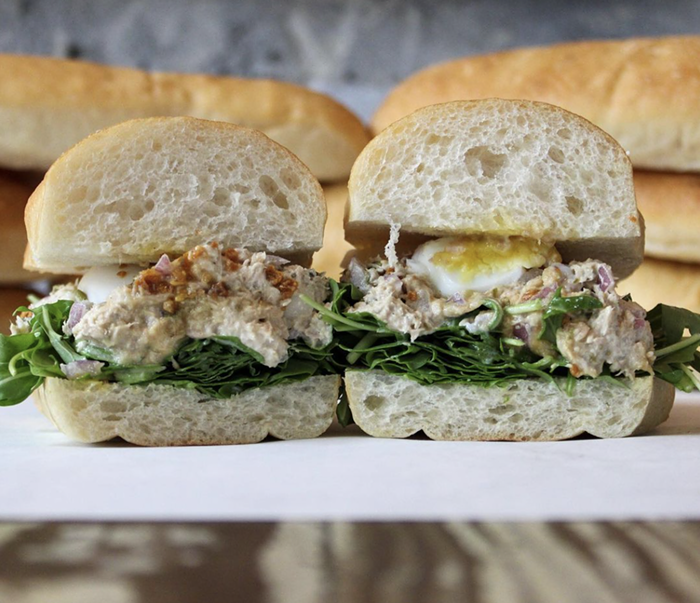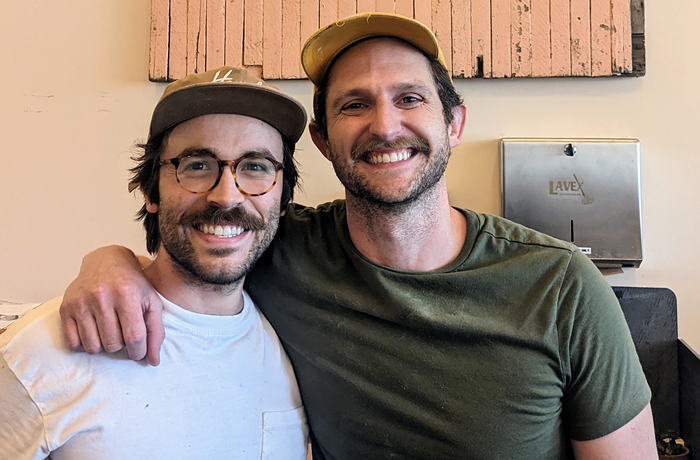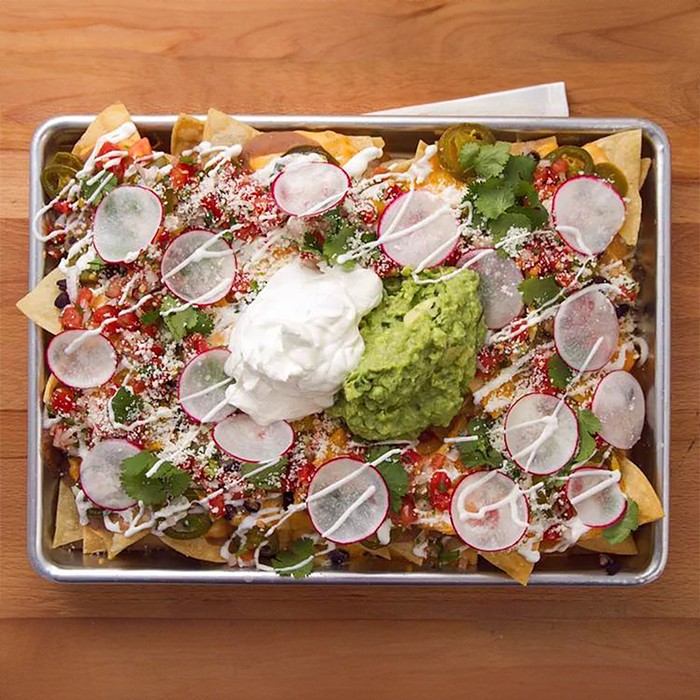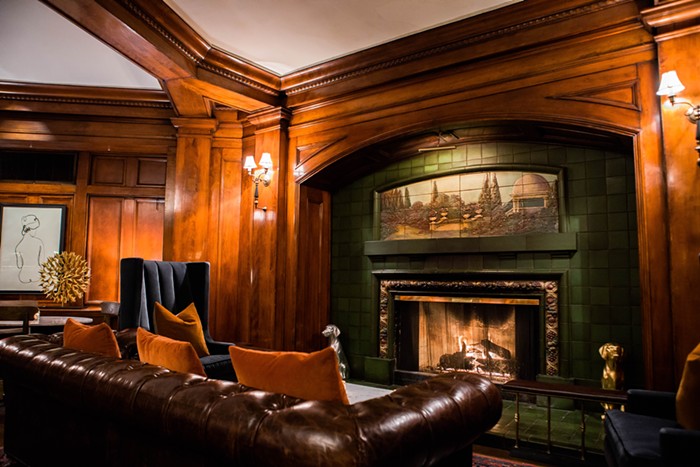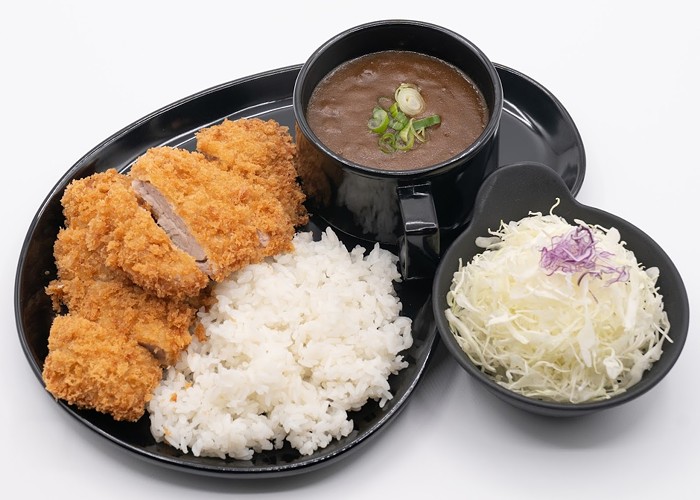When I roll up to the Urban Buggy for an interview with owner Dennis Comer, he's taking out the trash. But tossing garbage bags is a picnic compared to what Comer did in the army. He served in the Gulf War in 1990–91, stationed in Doha, Qatar, and King Khalid Military City, Saudi Arabia. In 1993, he saw action in Somalia during the Black Hawk Down days and also did a combat tour in Bosnia. As a logistics officer and research analyst, he was in charge of making sure people and cargo got where they needed to go as safely and efficiently as possible, but he puts it like this: "I did 20 years in the military, pretty much doing what the military does: destroying the earth."
These days, Comer's dedicated to the healthier pursuit of bringing unpretentious vegan food to the Central District—a neighborhood largely devoid of such stuff—and farming his own produce as a member of Seattle Tilth. Open since March, his tiny Urban Buggy is mainly a carryout lunch deli that also offers gluten-free vegan pastries and cookies made by Comer's wife, Lillian Hill, who runs Brown Sugar Baking Company—conveniently located right next to the Urban Buggy on a residential stretch of 22nd Avenue South.
Comer and Hill did not end up in Seattle by design. He's originally from El Paso, Texas, but he and Hill were living in Washington, DC. A few years ago, they were on vacation in San Francisco when she suffered a heart attack. They didn't want to go back to DC, so they decided to move to Seattle, where Hill's parents live. Hill's brother Edward used to be the manager of the great "farm incubator" Farm Works Program for Seattle Tilth—participants, including immigrants, refugees, and others with limited resources, get hands-on experience growing and harvesting food using organic practices, plus training on the business aspects of farming—and Comer thought he'd give it a try. He loved it.
Growing up in Texas, though, Comer had no inkling that his life would turn out like this. "I'm a computer science major," he says. "I was all about tech, and I did some of that in the military. Farming, getting back to nature, earth—that was nowhere in my career or field of vision, or my wildest dreams."
When he met his wife in DC, Comer—who confesses he still eats meat, though he's cut way back from his Texas days—didn't even know what veganism was. "I just started learning more about what she could do with her biochemistry background. I understood how she was putting products together. She wasn't using all the high-food-allergen stuff. I became more interested—it was definitely a healthier way to live. I was like, 'Eh, that's cool.' But I was sticking to farming."
So far, Urban Buggy isn't breaking even, but business has been steadily increasing, Comer says. His clientele mostly consists of teachers from Washington Middle School and employees from a nearby hospital. And while you shouldn't expect the rich, nuanced flavors of haute vegan bistros like Plum or Cafe Flora when you open your recyclable plastic Urban Buggy box, you'll get solid, working-class items like fajitas, tacos, sandwiches, and salads, all stuffed with locally grown produce. The Greek, kale Caesar, and spinach salads ($8) are unimpeachably nutritious and excellent, with a good balance of flavors and textures—right now, each features either strawberries or beets. The Field Roast hamburger ($9) is moist and subtly smoky, served with lettuce, red onions, tomato, and Vegenaise that Comer's spiced up Creole-style, although the bun—a white-bread one—ought to be composed of more fiber-intensive grains. The falafel sandwich ($8.50), with tomato, cucumber, parsley, red onion, and black-eyed-pea hummus, also could've used a whole-wheat rather than white tortilla—and a substantial injection of spiciness. But the fajita ($8.50) with grilled onions, zucchini, bell peppers, mushrooms, and squash was flavorful and filling. As far as after-lunch treats go, the oatmeal raisin cookie from Brown Sugar had a just-right chewy texture and nuanced sweetness.
Urban Buggy has zero employees besides Comer—the enthusiastic youth you'll find on-site during summertime are part of the Seattle Youth Employment Program, there on paid internships to learn what he knows and generally benefit from his vibrant, positive presence. He keeps the menu easy to make, but he also concentrates on variety. "When you say 'vegan,'" he says, "it brings out a range of emotions. We're trying to focus on the transitional people. If I can get somebody to come in and eat one meal a day, take out the red meat or whatever, and find out we've got tacos, barbecue and beef sandwiches, we've got hamburgers... they'll realize there's a lot of stuff that can be made vegan, and maybe they'll go home and try it themselves."
Does Comer think that veganism is the best hope to save the planet? "I believe that a more plant-based diet versus animal products is probably better for the planet," he says. "If veganism is the way to reduce the consumption of animal products—it seems to show that the less animal products and refined sugar you consume, the healthier you are—then why not?" ![]()

